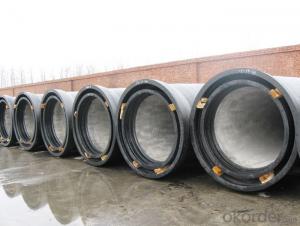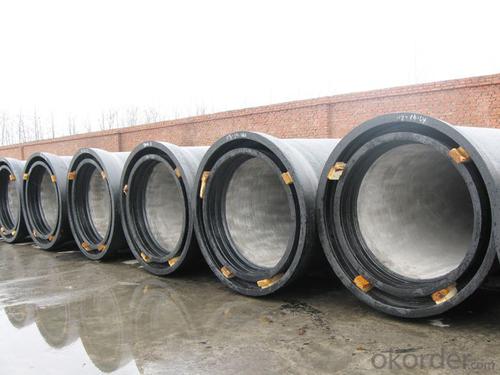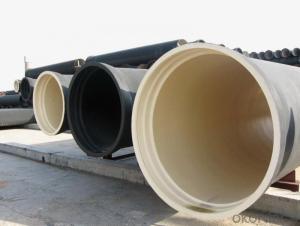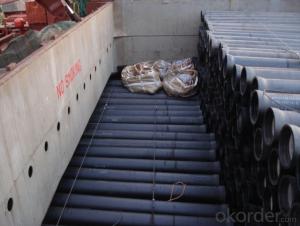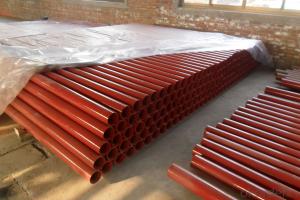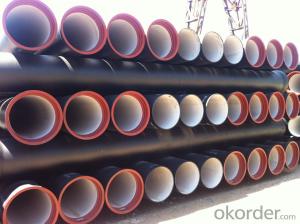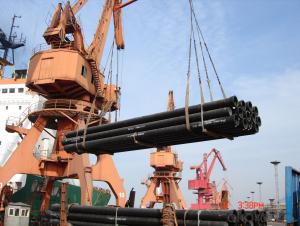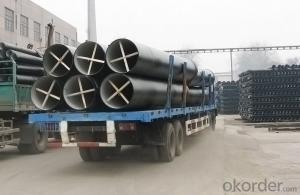Ductile Iron Pipe ISO2531 / EN545 / EN598 K9 DN300
- Loading Port:
- China main port
- Payment Terms:
- TT OR LC
- Min Order Qty:
- 20 m.t.
- Supply Capability:
- 100000 m.t./month
OKorder Service Pledge
OKorder Financial Service
You Might Also Like
1.Ductile Iron Pipe Description :
DI pipe fittings are manufactured according to ISO 2531 or BS EN545 or BS4772 FOR POTABLE WATER ,internal is cement lining or wet epoxy coating;External is zinc plus bitumen or wet epoxy coating. We also manufacture ductile iron fittings with fusion bonded epoxy both inside and outside. All the producets are sutible to water pipes fields.We have passed ISO9001,ISO14001,OHSMS18001 certificate.
2.Main Features of the Ductile Iron Pipe:
•High yield strength
•High tensile Strength
•High corrosion resistance
•Pressure Resistence
•Satisfy the highest hygienic standards
1. Material: Ductile iron grade 500-7/ 450-10 in accordance with ISO1083
2. Standard: ISO 2531, EN545, EN598, ANSI, AWWA
3. Certificate: ISO9001, ISO14001, SGS, NSF, WRAS
4. Test: In accordance with ISO 2531 / EN 545 / EN598 and 100% water pressure test
5. External coating: Zinc + Bitumen, conform to ISO8179
3.Ductile Iron Pipe Images:
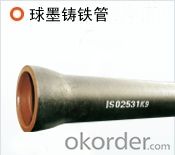
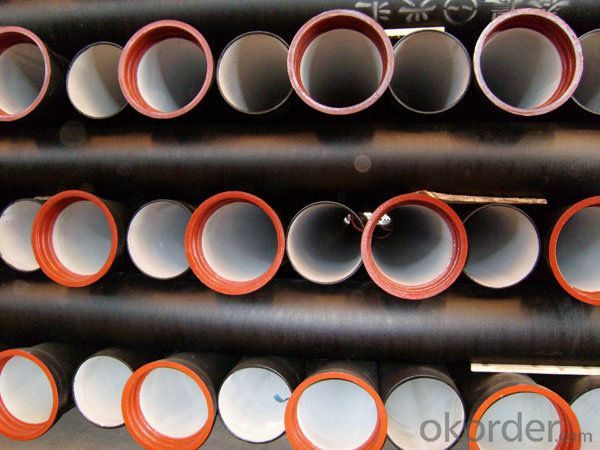
4.Ductile Iron Pipe Specification:
Place of Origin: China (Mainland)
Model Number: DN80-1600
Length: 6M/5.7M/NEGOTIATED
Standard: ISO2531 / EN545
Application: Potable/Sewage Water
Diameter: DN80-1600
Shape: Round
Hardness: 230
Pipe Wall Thickness: standerd
Material: Ductile Iron
water ductile iron pipe: SO2531 / EN545 DI pipe
5.FAQ:
We have organized several common questions for our clients,may help you sincerely:
1.Q: Why would you choose ductile iron pipe rather than other pipe materials?
A:The reasons are obvious for that not only ductile iron pipe possesses the inherent strength and flexibility of ductile iron, combined with proven corrosion protection systems, but also the cost savings can be achieved from design to installation and commissioning.
2.Q:Why can you guarantee the inner of pipes can’t be corroded?
A: High alumina cement mortar lining and sulphate-resistant cement mortar lining.These two special linings are applicable to inner anti-corrosion for sewage pipes, improving resistance to erosion of the sewage components.
- Q: Are ductile iron pipes suitable for use in irrigation canals?
- Ductile iron pipes excel in irrigation canals due to their robustness and endurance. Their exceptional strength and durability make them an optimal selection for water transportation in irrigation systems. With remarkable tensile strength, they withstand the demanding loads and pressures regularly encountered in irrigation canals. Moreover, their remarkable corrosion resistance makes them an ideal fit for environments with varying water quality. Additionally, they possess resistance against UV rays and extreme weather conditions, guaranteeing their long lifespan within irrigation canal systems. Additionally, ductile iron pipes efficiently handle high flow rates, enabling efficient water transportation over extensive distances, ensuring effective irrigation. In summary, ductile iron pipes offer an array of advantages and are a trustworthy and fitting option for usage in irrigation canals.
- Q: How are ductile iron pipes protected against abrasion or wear?
- Ductile iron pipes are protected against abrasion or wear through various methods, including external coatings and linings. These protective measures serve to create a barrier between the pipe's surface and any potential abrasive materials or fluids it may come into contact with. Additionally, the use of sacrificial anodes and cathodic protection systems can also help prevent corrosion and extend the lifespan of the pipes.
- Q: What are the typical joint restraint requirements for ductile iron pipes?
- Ductile iron pipes typically require joint restraints to prevent separation or pulling apart. Two common types of restraints are mechanical joint restraints and push-on joint restraints. Mechanical joint restraints are used when the pipe faces high internal pressures or external loads. They consist of a gland and a follower gland that are tightened around the joint with bolts or clamps. This secures the joint and prevents movement. On the other hand, push-on joint restraints are used when the pipe doesn't face high pressures or loads. They provide a seal and prevent separation due to ground movement or external forces. Push-on joint restraints are installed by pushing the pipe into the joint and securing it with a ring or collar. In addition to joint restraints, proper bedding and backfill materials are important for ductile iron pipes. These materials help distribute loads and provide stability, further enhancing the pipe's resistance to joint separation. It's important to note that the specific joint restraint requirements may vary depending on project specifications, pipe size, and operating conditions. Therefore, consulting the manufacturer's recommendations and engineering standards is essential for selecting and installing the proper restraints.
- Q: How does ductile iron pipe perform in areas with high groundwater levels?
- Ductile iron pipe performs exceptionally well in areas with high groundwater levels. One of the key advantages of ductile iron pipe is its corrosion resistance, which makes it highly suitable for underground applications and areas with high water tables. Unlike other materials, ductile iron pipe is not susceptible to rust or corrosion caused by groundwater, ensuring its durability and longevity. Furthermore, ductile iron pipe has excellent strength and flexibility, allowing it to withstand the external pressure exerted by high groundwater levels. It can resist the buoyant forces exerted by water, preventing it from floating or shifting out of place. In addition, ductile iron pipe's joints are tightly sealed, preventing any groundwater from infiltrating the pipe system. This ensures that there is no leakage or contamination of the water supply, which is crucial in areas with high groundwater levels. Overall, ductile iron pipe is the ideal choice for areas with high groundwater levels due to its corrosion resistance, strength, and ability to maintain a tight, secure system. It provides a reliable and long-lasting solution for water distribution and sewer systems, even in challenging environments.
- Q: Are ductile iron pipes suitable for use in industrial applications?
- Ductile iron pipes possess the necessary qualities to be used in industrial settings. They are renowned for their robustness and durability, which renders them perfect for handling the rigorous demands of industrial environments. Moreover, these pipes are resistant to corrosion and can endure high pressures and temperatures. Additionally, they exhibit exceptional resistance to impact, thus making them appropriate for areas with heavy traffic or potential mechanical damage. Furthermore, their flexibility allows them to absorb vibrations and shocks, thereby further enhancing their suitability for industrial usage. Consequently, ductile iron pipes are a dependable and cost-efficient option for various industrial sectors, including water and wastewater treatment, mining, power generation, and chemical plants.
- Q: Can ductile iron pipe be used for hydropower systems?
- Yes, ductile iron pipe can be used for hydropower systems. Ductile iron pipe is known for its strength, durability, and corrosion resistance, which makes it an ideal choice for various applications, including hydropower systems. The high tensile strength of ductile iron allows it to withstand the high pressure and load requirements of such systems. Additionally, its corrosion resistance properties make it suitable for use in water environments, ensuring a long lifespan and minimal maintenance needs. Therefore, ductile iron pipe can be effectively utilized for hydropower systems, providing a reliable and efficient solution for transporting water and supporting the infrastructure of the system.
- Q: How many meters does the cast iron water supply pipe dn150,1 tons?
- When pouring added calcium alloy in the flow inlet for graft inoculation, every time after the pouring, need in the mold surface with compressed air spraying a thin layer of dry calcium silicate powder, a centrifuge is composed of upper and lower halves of the closed shell, the supporting cast roller is installed on the bottom of the shell, the mold in front of a ring gear mounted on the housing at the end of the DC motor through the transmission gear direct mold, shell mold through Hugh ends are equipped with sealing ring, the front end of the shell shell installed with half ring a turning cylinder pictophonetic mountain Rae centrifuge under the wheels, so as to make reciprocating motion on the inclined orbit
- Q: How do ductile iron pipes handle differential settlement?
- Ductile iron pipes possess exceptional durability and are renowned for their ability to endure diverse environmental conditions, including differential settlement. Differential settlement refers to the uneven settling of the ground, which can often impose stress and strain on underground pipes. Specifically engineered to address settlement issues, ductile iron pipes exhibit inherent flexibility and strength. These pipes possess the capacity to flex and accommodate slight ground movements without incurring significant damage or failure. The flexibility of ductile iron pipes enables them to evenly distribute the stress and strain caused by differential settlement along their length. This characteristic assists in averting concentrated stress points that could potentially result in cracks or fractures in the pipe. Furthermore, the inherent strength of ductile iron pipes equips them with the necessary resistance to withstand the forces generated by differential settlement. The pipes' robust construction and high tensile strength render them less susceptible to deformation or damage caused by ground movements. Moreover, ductile iron pipes are commonly installed with flexible joints, such as rubber gaskets or push-on joints. These joints permit some movement and adapt to any slight misalignment or settlement that may occur. By providing flexibility at the joints, the pipes can better adjust to changes in ground conditions and diminish the risk of failure. In conclusion, ductile iron pipes possess the necessary attributes to effectively cope with differential settlement due to their flexibility, strength, and utilization of flexible joints. These features guarantee that the pipes can endure ground movements and continue to function efficiently without compromising their integrity or longevity.
- Q: How do ductile iron pipes handle concentrated loads?
- Ductile iron pipes are highly resistant to concentrated loads due to their inherent strength and flexibility. They have the ability to distribute the load over a larger area, minimizing the risk of failure or damage. This makes them suitable for handling heavy loads and ensuring long-term durability in various applications.
- Q: Can ductile iron pipes be used for pressure surge applications?
- Yes, ductile iron pipes can be used for pressure surge applications. Ductile iron pipes have excellent strength and durability, making them suitable for handling surge pressures caused by sudden changes in flow rates or water hammer events. They can withstand high internal pressures and have a high resistance to impact and fatigue. Additionally, ductile iron pipes have a smooth interior surface that allows for efficient flow of fluids, minimizing the potential for pressure surges. However, it is important to consider factors such as pipe size, wall thickness, and proper installation techniques to ensure the pipes can safely handle the specific pressure surge conditions in a given application. Consulting with a professional engineer or pipe manufacturer is recommended to determine the suitability of ductile iron pipes for pressure surge applications.
Send your message to us
Ductile Iron Pipe ISO2531 / EN545 / EN598 K9 DN300
- Loading Port:
- China main port
- Payment Terms:
- TT OR LC
- Min Order Qty:
- 20 m.t.
- Supply Capability:
- 100000 m.t./month
OKorder Service Pledge
OKorder Financial Service
Similar products
Hot products
Hot Searches
Related keywords
